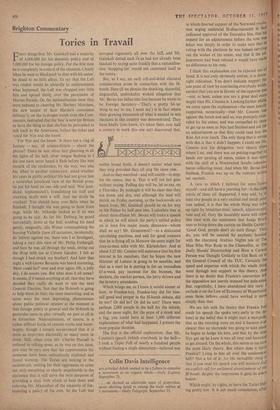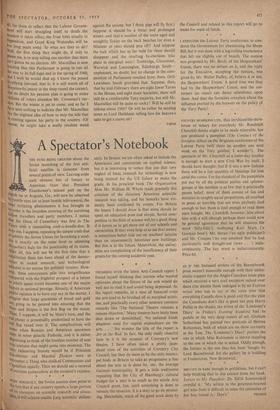Brighton Commentary
Tories in Travail
FIRST things first. Mr. Gaitskell had a majority of 4,000,000 for his domestic policy and of 5,000,000 for his foreign policy. For the first time he is completely in control of the situation. Clearly when he went to Blackpool 'to dine with his union' he dined to no little effect. To say that the Left was routed would be absurdly to underestimate what happened; the Left was chopped into little bits and spread thinly, over the pavements of Marine Parade. On the nationalisation issue they were reduced to cheering Mr. Herbert Morrison, the new keeper of Keir Hardie's conscience (blimey !); on the hydrogen bomb even the Com- munists, instructed that the 'line' is now for Britain to have the thing so that she'can be persuaded to talk back to the Americans, bolted the ticket and voted for Nye and the bomb.
'For Nye and the bomb.' Is there not a ring of fantasy — nay, of science-fiction — about the phrase? There he was, silver hair gleaming in all the lights of the hall, silver tongue flashing as I for one have never heard it flash before (the best remark of the conference, by the way, was also his, albeit in another connection; asked whether his years in public political life had not given him a somewhat jaundiced view of the British press, he put his head on one side and said, 'Not jaun- diced; sophisticated'), brandishing his staff and cracking skulls with a will. And the skulls he cracked! You should have seen Babs when he finished; I thought she was going to faint from rage, while Mr. M ikardo looked as if he was going to be sick. As for Mr. Driberg, he gazed sorrowfully down at the hall, nodding his head gently, resignedly, like Wotan contemplating the burning Valhalla (how all occasions, incidentally, do inform against me; there was I at Southport, taking a very dim view of Mr. Philip Fothergill, and here he was, all through the week, sitting out the Ring with me at Covent Garden; I felt as though I had struck my brother). And later that night a well-known Bevanite was heard muttering, 'How could he?' over and over again. Oh, a jolly day, I do assure you. But what does it all mean? It means, if it means anything at all, that they have decided they really do want to win the next General Election. Not that the H-bomb is going to help them do that; the most interesting, and in some ways the most depressing, phenomenon about public political opinion at the moment is that foreign policy in general and the H-bomb in particular seem to play virtually no part at all in its formation. Nationalisation, of course, is a rather difficult kettle of cement-works and water- supply, though I remain unconvinced that it is quite as important electorally as many seem to think. Still, when even Mr. Charles Pannell is reduced to talking sense, as he was on this issue, you may be very sure that the opportunities for nonsense have been meticulously explored and found wanting. The Tories are lurking in the underbrush, waiting for their opponents to come out with something so clearly unpalatable to the electorate that it will serve the twin purposes of providing a stick with which to beat them and relieving Mr. Macmillan of the necessity a for- mulating a policy of his own. So the Left was larruped vigorously all over the hall, and Mr. Gaitskell dotted such i's as had not already been blacked by saying quite frankly that a nationalisa- tion 'shopping-list' would not commend itself to the voters.
But, as I say, no such cut-and-dried electoral consideration arose in connection with the H- bomb. Here (if we dismiss the shocking, shameful, disgraceful, unthinkably wicked allegation that Mr. Bevan has fallen into line because he wants to be Foreign Secretary—`That's a pretty bit-ter thing to say to me, I must say') is in fact where their growing awareness of what is needed to win elections in this country was demonstrated. They have finally (you know, it's taken them over half a century to work this one out) discovered that, within broad limits, it doesn't matter what tune they sing provided they all sing the same one.
And so they marched—and will march—in step; for the nonce, that is. That it will not last goes without saying. Polling day will be, let us say, on a Thursday. By midnight it will be clear that they are home and dry, and although the lead will shrink on Friday morning, as the backwoods are heard from, Mr. Gaitskell should be on his way to the Palace by half-past two. I calculate that at about three-fifteen Mr. Bevan will make a speech in which he will attack the party's settled policy on at least five major issues, denounce—whom shall we say? Mr. Greenwood?—as a desiccated calculating machine, and add for good measure that he is flying off to Moscow the same night for man-to-man talks with Mr. Khrushchev. And at about 3.25 Mr. Cousins will announce that his first interest is his members, that he hopes the new Minister of Labour is going to be sensible, and that as a start he is putting in for an immediate L5-a-week pay increase for the busmen, the dockers, the market porters, the lorry drivers and the lavatory attendants.
Which brings me, as I knew it would sooner or later, to Frankie-boy. Frankie-boy did for him- self good and proper in the H-bomb debate, did he not? Or did he? Or did he not? There were perhaps 2,000 people in the hall for the debate, and the same night, for the price of a drink and a fag, you could have at least 1,900 different explanations of what had happened. I present the most popular theories.
The first is the official explanation; that Mr. Cousins's speech (which everybody in the hall— I took a Taper Poll of nearly a hundred people without finding a single dissentient—believed was in whole-hearted support of the Norwood resolu- tion urging unilateral H-disarmament) in fact indicated approval of the Executive line, that his request for an adjournment before the vote was taken was simply in order to make sure that in voting with the platform he was indeed carrying out the wishes of his union, and that if the ad- journment had been refused it would have made no difference to his vote.
I think this explanation can be rejected out of hand. It is not only obviously untrue; it is down- right ridiculous. You don't indicate support for one point of view by convincing everybody within earshot that you are in favour of the opposite one —not, at least, unless you are a great deal more stupid than Mr. Cousins is. Looking further afield, we come upon the explanation—the most heavily supported, numerically—that Mr. Cousins was against the bomb and said so, was promptly over- ruled by his union, and was compelled by thein to get up as soon as Nye had finished and ask for an adjournment so that they could read him the Riot Act over lunch. The only thing that is wrong with this is that it didn't happen; I could see Mr. Cousins and 'his delegation very clearly from where I sat, and there was no putting-together of heads nor passing of notes, unless it was done with the skill of a Wormwood Scrubs tobacco' baron collecting snout. And when Mr. Bevan had finished, Frankie was up on the rostrum within ten seconds.
A view to which I inclined for some hours myself—and still have a yearning for—is the most subtle of them all. Supported, I may add, by Ut least two people in a very exalted and inside post - lion indeed, it is that the whole thing was sewn up tight by breakfast-time; speech, adjournment, vote and all. Only the incurably naive will reject this view with the sentiments that Judge Brack uses to bring down the curtain on Hedda Gabler: 'Good God, people don't do such things.' They do, you will be assured by anybody familiar with the charming Arabian Nights tale of The Man Who Was Rude to the Chancellor, or The Daily Herald Directorship and How a Certain Person was Thought Unlikely to Get Back on to the General Council of the TUC. Certainly the speed and expertise with which the whole thing went through lent support to this theory. And there is no doubt that Frankie's conversion left the opposition not merely stunned but pole-axed. But, regretfully, I have abandoned this view. exclude it on the Law of Economy of Hypothesis; even those fellows could have worked it more simply than that.
We are left with the theory that Frankie had made his speech (he spoke very early in the de- bate) in the belief that it might start a stampede, that as the morning wore on and it became ever clearer that no stampede was going to take place he began to hedge his bets, and that by the time Nye got up he knew it was all over and hastened to get aboard. On the whole, this seems to me noW the most likely theory. But where does it leave Frankie? Lying in bits all over the conference.- hall? Not a bit of it; for the incredible thing Is that if you read his speech you will nowhere find an explicit call for unilateral abandonment of the H-bomb, despite the impression it gave its evetY hearer.
Which ought, by rights, to leave the Tories feel- ing pretty low. It is not much consolation, after all, for them to reflect that the Labour Govern- ment will start strangling itself to death the Moment it takes office; the frost bites cruelly in OPPosition, and Good King Wenceslas will be five long years away. So what are they to do? Well, the first thing they might do, if only to Please me, is to stop telling one another that there ain't gonna be no election. Mr. Macmillan is now Insisting that this Parliament is going to run all Me way to its full legal end in the spring of 1960, and i wish he would shut up. I know the pound Is rallying (abroad, that is; it is still worth all of fivepence-ha'penny in the shop round the corner), and no doubt his pension plan is going to make millions of voters abandon Mr. Crossman's ver- sion. But the winter is yet to come, and so far I have seen nothing to indicate that Mr. Macmillan has the slightest idea of how to stop the tide that is running against his party in the country. (Of course, he might take a really resolute stand
against the unions; but I think pigs will fly first.) Suppose it should be a bitter and prolonged winter, and that a number of the more aged and unsightly Tories on the back benches (or even a Minister or two) should pop off? And suppose the luck which has so far held for them should disappear and the resulting by-elections take place in marginal seats? Tonbridge, Gloucester, Warwick and Leamington, Edinburgh South— unpleasant, no doubt, but no change in the com- position of Parliament resulted from them. Only Lewisham South provided that. Suppose, then, that by mid-February there are eight fewer Tories in the House, and eight more Socialists; there will still be a comfortable Tory majority, but will Mr. Macmillan still be quite so cocky? Will he still be talking about 1960? Or will he rather be sending notes to Lord Hailsharn, telling him for heaven's sake to get a move on?
TAPER



































 Previous page
Previous page